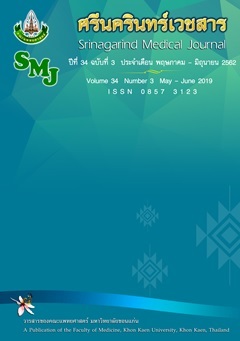A Study of the Relationship between Selected Personal Factors, Professional Practice Environment and Job Satisfaction of Registered Nurses in Thailand
Keywords:
selected personal factors, professional practice environment, job satisfaction, registered nurses, ปัจจัยส่วนบุคคลที่คัดสรร, สภาพแวดล้อมการปฏิบัติงาน, ความพึงพอใจในงาน, พยาบาลวิชาชีพAbstract
การศึกษาความสัมพันธ์ระหว่างปัจจัยส่วนบุคคลที่คัดสรร สภาพแวดล้อมการปฏิบัติงานกับความพึงพอใจในงานของพยาบาลวิชาชีพในประเทศไทย
จันทิมา ฤกษ์เลื่อนฤทธิ์* , รักชนก คชไกร
ภาควิชาการพยาบาลสาธารณสุขศาสตร์ คณะพยาบาลศาสตร์ มหาวิทยาลัยมหิดล
หลักการและวัตถุประสงค์: ความสัมพันธ์ระหว่างปัจจัยส่วนบุคคลที่คัดสรร สภาพแวดล้อมการปฏิบัติงานที่เสริมพลังบวก และความพึงพอใจในงานของพยาบาลวิชาชีพนำไปสู่การพยาบาลที่มีประสิทธิภาพและส่งผลต่อการเพิ่มขึ้นของคุณภาพชีวิตของพยาบาลวิชาชีพและผู้รับบริการ การศึกษาจึงมีวัตถุประสงค์เพื่อศึกษาความสัมพันธ์ระหว่างปัจจัยส่วนบุคคลที่คัดสรร สภาพแวดล้อมการปฏิบัติงานกับความพึงพอใจในงานของพยาบาลวิชาชีพในประเทศไทย
วิธีการศึกษา: เป็นการศึกษาแบบบรรยายเชิงความสัมพันธ์ในพยาบาลวิชาชีพที่ขึ้นทะเบียนใบอนุญาตประกอบวิชาชีพการพยาบาลชั้นหนึ่งหรือการพยาบาลและการผดุงครรภ์ชั้นหนึ่ง และมีประสบการณ์ไม่น้อยกว่า 1 ปี จำนวน 2,340 ราย เก็บข้อมูลโดยใช้แบบสอบถามทางอิเลคโทรนิคเกี่ยวข้องกับ 1) ปัจจัยส่วนบุคคลที่คัดสรร 2) สภาพแวดล้อมการปฏิบัติงาน และ 3) ความพึงพอใจในงานของพยาบาลวิชาชีพ เก็บข้อมูลตั้งแต่ 15 กุมภาพันธ์ ถึง 31 พฤษภาคม 2561 วิเคราะห์ข้อมูลด้วยการหาค่าความถี่ ร้อยละ ค่าเฉลี่ย ส่วนเบี่ยงเบนมาตรฐาน ค่าสัมประสิทธิ์สหสัมพันธ์ของเพียร์สัน และสถิติไคสแควร์
ผลการศึกษา: พบว่าจากแบบสอบถามที่มีข้อมูลสมบูรณ์จำนวน 1,911 ราย พบว่า อายุ ประสบการณ์พยาบาล จำนวนชั่วโมงในการปฏิบัติงานในรอบสัปดาห์ที่ผ่านมา จำนวนเวรทั้งหมดในรอบ 1 เดือนที่ผ่านมา จำนวนเวรเช้า-บ่าย-ดึก และค่าตอบแทนมีความสัมพันธ์กับความพึงพอใจในงานของพยาบาลวิชาชีพอย่างมีนัยสำคัญทางสถิติที่ระดับ .05 และพบว่าสภาพแวดล้อมการปฏิบัติงานมีความสัมพันธ์ทางบวกกับความพึงพอใจในงานของพยาบาลวิชาชีพอย่างมีนัยสำคัญทางสถิติที่ระดับ <.001 (r=.43)
สรุป: ความพึงพอใจในงานของพยาบาลวิชาชีพในประเทศไทยมีความสัมพันธ์กับปัจจัยส่วนบุคคลที่คัดสรร และมีความสัมพันธ์ทางบวกกับสภาพแวดล้อมการปฏิบัติงาน
Background and Objective: Relationship between selected personal factors, positive professional practice environment and registered nurses’ job satisfaction lead to effective nursing care and increasing quality of life in both registered nurses and patients. This study aimed to investigate the relationship between selected personal factors, professional practice environment, and job satisfaction of registered nurses in Thailand.
Method: This descriptive correlational study design included the 2,340 registered nurses having experience more than 1 year. The data were collected using 3 electronic questionnaires which involved 1) selected personal data questionnaire, 2) professional practice environment questionnaire, and 3) registered nurses’ job satisfaction questionnaire. The data was conducted since 15 February to 31 May 2018. The data were statistically analyzed by using frequency, percentage, mean, standard deviation Pearson's correlation coefficient and chi-square.
Result: The 1,911 complete questionnaires showed that a statistically significant less than .05, correlation was found between age, nursing experience, job hours during one week ago, total hours in morning, afternoon and night period, and salary, and job satisfaction of professional nurses. Moreover, practice environment and job satisfaction of professional nurses were moderately correlated each other at level of significance less than .001.
Conclusion: Job satisfaction of professional nurses in Thailand was related to selected personal factors and a positive relationship with the professional practice environment.
References
Liu Y, Aungsuroch Y, Yunibhand J. Job satisfaction in nursing: a concept analysis study. Int Nurs Rev 2016; 63: 84–91.
Al Maqbali MA. . Factors that influence nurses’ job satisfaction: a literature review. Nurs Manag 2015; 22: 30-7.
de Almeida1 MH, Orgambíde z-Ramos A, Batista P. Workplace empowerment and job satisfaction in Portuguese nursing staff: An exploratory study. Cent Eur J Nurs Midw 2017; 8: 749–55.
Gutierrez AP, Candela LL, Carver L. The structural relationships between organizational commitment, global job satisfaction, developmental experiences, work values, organizational support, and person-organization fit among nursing faculty. J Adv Nurs 2012; 68: 1601–14.
Somjit Daenseekaew, Donwiwat Saensom, Naruemol Singha-Dong, Piyanuch Boonkong. Nursing practice environments in Northeast Thailand. Journal of Nursing and Health Care 2017; 35: 216-226.
Andrioti D, Skitsou A, Karlsson LE, Pandouris C, Krassias A, Charalambous G. Job Satisfaction of Nurses in Various Clinical Practices. International Journal of Caring Sciences 2017; 10: 76-87.
Carrillo-García C, del Carmen Solano-Ruíz M, Martínez-Roche ME, Gómez-García CI. Job satisfaction among health care workers: the role of gender and age. Rev Lat Am Enfermagem 2013; 21: 1314-20.
Dall’Ora C, Griffiths P, Ball J, Simon M, Aiken LH. Association of 12th shifts and nurses’ job satisfaction, burnout and intention to leave: findings from a cross-sectional study of 12 European countries. BMJ Open 2015; 5: e008331
. Rochefort CM, Clarke SP. Nurses’ work environments, care rationing, job outcomes, and quality of care on neonatal units. J Adv Nurs 2010; 66: 2213–24.
Penpidcha Lwandee,, Yaowalak Amrumpai.. Job motivation and job satisfaction among nurses in Banphaeo Hospital Public Organization. Kuakarun Journal of Nursing 2015; 22: 48-59.
Supannee Pumfang,, Boonjai Srisatidnarakul.. Factors of job stress for professional nurses in tertiary hospital. Kuakarun Journal of Nursing 2015; 22: 140-53.
Fochsen G, Sjogren K, Josephsoo M, Lagerstrom M. Factor contributing to the decision to leave nursing care: A study among Swedish nursing personnel. J Nurs Manag 2005; 13: 338-44.
Kannika Ruangdej, Paiboon Chaosuansreecharoen, Suchat Sungkeao. Job satisfaction of nurses from the Southern nursing shortage problem solving project. Nursing Journal of the Ministry of Public Health 2014; 24: 12-29.
Kitjaporn Ueatrongchit, Orasa Panpakdee, Apinya Siripittayakunkit. Factors contributing to advanced practice nurses’ professional satisfaction such satisfaction. Thai Journal of Nursing Council 2012; 27: 5-16.
Jongjaipagdee P. Job satisfaction of professional nurse in Ramathibodi hospital (Thesis). Faculty of Graduate Studied, Mahidol University; 2013.
Thai PBS. Special report: Professional nursing shortage: Harder work, less compensation 2559. [Retrieved Dec10, 2018] Available from: https://news.thaipbs.or.th/content/251316 (in Thai)
Akakul T. Research methodology in behavioral sciences and social sciences. Ubonrachathanee: Ratchapad Ubonrachathanee, 5th ed, 2007. (in Thai)
Senadisai S, Koshakri R, Kedcham A, Rerkluenrit J, Meekusol S, Jewpattanakul Y, et al. Research report: A survey of professional nurses Positive Practice Environment (PPE) in Thailand; 2018. (in Thai)
Schwendimann R, Dhaini S, Ausserhofer D, Engberg S, Zúñiga F. Factors associated with high job satisfaction among care workers in Swiss nursing homes – a cross sectional survey study. BMC Nurs 2016; 15: 37.
Lambrou P, Merkouris A, Middleton N, Papastavrou E. Nurses’ perceptions of their professional practice environment in relation to job satisfaction: A review of quantitative studies. Health Science Journal 2014; 8: 298-317.
Van Bogaert P, Clarke S, Wouters K, Franck E, Willems R, Mondelaers M. Impacts of unit-level nurse practice environment, workload and burnout on nurse-reported outcomes in psychiatric hospitals: A multilevel modelling approach. Int J Nurs Stud 2013; 50: 357-65.


